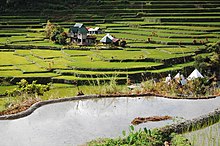Punnuk
| Punnuk | |
|---|---|
| Country | Philippines |
| Domains |
|
| Reference | 01080 |
| Region | Asia and the Pacific |
| Inscription history | |
| Inscription | 2015 (10th session) |
| List | Intangible Cultural Heritage of Humanity |
 | |

Punnuk is a traditional tug of war from the Philippines practiced by the Tuwali-speaking people who live in Hungduan, Ifugao.[1] The competition, held in Hapao River, is observed after the completion of harvest.[2] It formally puts to a close the farming cycle, and signals the beginning of a new one.[3]
Setting
The barangays of Hapao Proper, Nungulunan and Baang in Hungduan, Ifugao practice punnuk.[3] The three barangays are distinctive for their terraced ricefields with stone-walling.[4] Hapao River, the setting for punnuk, flow from Mt. Alawitan and Mt. Polis, and is fed by tributaries from Mt Kapiligan.[1]
Participants
Traditionally, only men join punnuk in the river while the women cheer only. In 2012, a tug-of-war exclusively for women was held.[1]
Game
Punnuk needs two elements: a tinaggu (also known as kinaag) and a pakid.
It is believed that the winning side will always have their rice granary replenished and full.[2] Meanwhile, the losers will have their harvest be easily consumed and thus will not last until the next harvest season.[6]
UNESCO Recognition
Punnuk, together with tugging rituals and games in Cambodia, South Korea, and Vietnam, were collectively included in UNESCO's Intangible Cultural Heritage of Humanity List in 2015.[7] The decision was made at the 10th Intergovernmental Committee for the Safeguarding of the Intangible Cultural Heritage meeting held in Windhoek, Namibia.[8]
External links
- Tugging rituals and games, UNESCO
References
- ^ a b c Respicio, Norma (June 12, 2013). "Punnuk: Closing the Harvest Season with the Tug-of-War along the River Hapao" (PDF). UNESCO. Retrieved February 9, 2024.
- ^ a b c "Philippines, South Korea engage in tug-of-war". Lifestyle.INQ. 2019-12-29. Retrieved 2024-02-09.
- ^ a b c Geminiano, Pamela Mariz (August 1, 2018). "Ifugao's post-harvest ritual 'Punnuk' amazes DOT head". Philippine News Agency.
- ^ "What is "heritage" for the Hungduan people?" (PDF). 2012. Retrieved February 9, 2024.
- ^ a b c "Punnuk, the Tugging Ritual in Hungduan, Closing an Agricultural Cycle". April 30, 2019. Retrieved February 9, 2024.
- ^ a b "Punnuk: An ancient celebration of harvest at the Ifugao Rice Terraces". PLN Media. August 27, 2014. Retrieved February 9, 2024.
- ^ VietnamPlus (2015-12-03). "Tugging rituals, games named cultural heritage of humanity | Culture - Sports | Vietnam+ (VietnamPlus)". VietnamPlus. Retrieved 2024-02-09.
- ^ en.baochinhphu.vn (2015-12-04). "Tug of War becomes Intangible Cultural Heritage of Humanity". en.baochinhphu.vn (in Vietnamese). Retrieved 2024-02-09.
